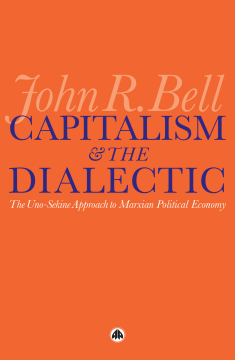
Additional Information
Book Details
Abstract
From the 1960s to the 1990s the ground-breaking Japanese economists Kozo Uno and Thomas Sekine developed a masterful reconfiguration of Marxist economics. The most well-known aspect of which is the levels of analysis approach to the study of capitalism.
Written in Japanese, the Uno-Sekine approach to Marx's work is little understood in West. John Bell seeks to correct this, explaining how problematic elements of Marxian Political Economy such as the law of value and the law of relative surplus population can be solved by using a more rigorous dialectical analysis.
Bell's clear and accessible synthesis provides economists with the tools to interrogate capitalism in a more powerful way than ever before.
'Rarely do refined analytical clarity and theoretical precision combine with careful contextualiSation and adamant intellectual honesty to expound a levels-of-abstraction approach'
Stefanos Kourkoulakos, Department of Political Science, York University, Toronto
'John Bell, who has worked closely with Sekine for over 25 years, is best placed to write a much needed clear and accessible introduction'
Rob Albritton
'On important questions of Marxist theory around which debate in Western academies began to swirl from the 1970s onward the Japanese political economist Kozo Uno had already made major interventions decades earlier ... John Bell’s book helps to fill an intellectual gap in the profession of Marxist studies'
Richard Westra, Associate Professor, Pukyong National University, South Korea is author of Political Economy and Globalization.
'A clear introduction to a groundbreaking but little-known approach to Marxian economics: the Uno-Sekine approach'
Tom Sekine
Table of Contents
| Section Title | Page | Action | Price |
|---|---|---|---|
| Cover | Cover | ||
| Contents | v | ||
| Preface | vi | ||
| Introduction | 1 | ||
| Part I: Dialectical Theory of Capitalism: Circulation | 19 | ||
| 1. Commodity, Value, Money and Capital Forms | 21 | ||
| Part II: Dialectical Theory of Capitalism: Production | 51 | ||
| 2. Capitalist Production | 53 | ||
| 3. The Circulation and Reproduction of Capital | 82 | ||
| Part III: Dialectical Theory of Capitalism: Distribution | 113 | ||
| 4. The Theory of Profit | 115 | ||
| 5. Business Cycles | 135 | ||
| 6. Rent, Commercial Credit and Loan Capital | 149 | ||
| 7. Interest-Bearing Capital Closes the Dialectic | 169 | ||
| Part IV: Capitalism and History | 177 | ||
| 8. The Stages Theory of Capitalist Development | 179 | ||
| 9. Conclusion: Capitalists Beyond Capitalism | 205 | ||
| Notes | 223 | ||
| Bibliography | 227 | ||
| Index | 231 |
